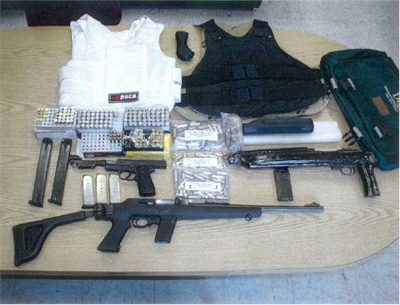Phuket Gazette: Central America most violent; U.S. Coast Guard crash; Hackers arrested

– World news compiled by Gazette editors for Phuket’s international community
The International Narcotics Control Board (INCB), which identified Honduras, Costa Rica and Nicaragua as key transit countries for smuggling drugs primarily destined for the United States, stated that drug trafficking organizations have increased their operations in the region, posing a serious threat to the security of the region.
In its annual report, the INCB said the increase in drug-related violence comes as many Mexican drug cartels – under pressure from Mexican authorities – have moved their operations south of the border. Furthermore, the report noted that El Salvador, Guatemala, Honduras and Jamaica now have the world’s highest homicide rates as a result of drug-related activities, and the proliferation of street gangs and availability of firearms has led to an increase in crime rates.
With more than 45,000 people in the region dying of drug-related causes every year, North America has remained the world’s largest drug market, followed by Europe. The alarming death rates constitute the highest annual drug-related mortality rate in the world.
INCB also highlighted the increasing flow of heroin into Africa which is causing a surge in drug abuse throughout the region, particularly in East and Southern Africa.
Last year, record seizures of heroin were carried out in Kenya and Tanzania, and the smuggling of other drugs such as cocaine and cannabis continue to pose a threat to the region, with INCB warning that most countries still lack appropriate systems to monitor and combat drug abuse.
The report also emphasizes the abuse of prescription drugs and over-the-counter pharmaceutical preparations in South Asia, stressing that many of these are being sold through illegal Internet pharmacies which target a young audience.
It also warns that in East and South-East Asia as well as South Asia, the use of amphetamines is increasing and is contributing to a higher rate of HIV and hepatitis C infections.
The accident happened at approximately 7:40pm local time when a Coast Guard MH-65C helicopter crashed approximately 3 miles (4.8 kilometers) from the shore in Mobile Bay, a Gulf of Mexico inlet which is located in the state of Alabama. Four people were on board.
Soon after the accident, one of the crew members was found unresponsive by the crew of a 26-foot (7.9-meters) Coast Guard Aids to Navigation Boat. The crew member, whose identity was not immediately released, was later declared deceased. Searches for the three other crew members were continuing on Wednesday.
“CG-6535 was flown by a four-person crew and was conducting training operations,” said Coast Guard Commandant Admiral Robert Papp. “A full Coast Guard and interagency search and rescue effort was launched – the aircraft was quickly located. One deceased crew member was recovered, and extensive efforts continue to locate the other three crew members.”
At least three aircraft and half a dozen boats are involved in the search effort, as well as Good Samaritan vessels. Authorities have remained hopeful as the crew members were equipped with survival gear, but chances of finding survivors were diminishing quickly on late Wednesday.
“Our thoughts and prayers are with the families of the crew members during this difficult time,” said Captain Don Rose, commander of Coast Guard Sector Mobile. “We are working through the night to continue to conduct a robust search for the three crew members who are still missing and we appreciate the assistance of all of the agencies and personnel who are volunteering their time and resources to assist with the search and rescue efforts.”
The cause of the accident was not immediately known, but Papp promised a detailed investigation. “We will conduct a full investigation into this incident to determine the cause,” he said in an e-mail.
A total of 25 individuals across four countries in Latin America and Europe were arrested in an international operation, which was launched in mid-February following a series of coordinated cyber-attacks originating from Argentina, Chile, Colombia and Spain against the Colombian Ministry of Defense and presidential websites, as well as Chile’s Endesa electricity company and its National Library, among others.
“This operation shows that crime in the virtual world does have real consequences for those involved, and that the Internet cannot be seen as a safe haven for criminal activity, no matter where it originates or where it is targeted,” said Bernd Rossbach, Acting INTERPOL Executive Director of Police Services.
The Interpol-backed Operation Unmask, as it was dubbed, was carried out by national law enforcement officers in Argentina, Chile, Colombia and Spain. Interpol said its Latin American Working Group of Experts on Information Technology (IT) Crime facilitated the sharing of intelligence following operational meetings in the four participating countries.
Some 250 items of IT equipment and mobile phones were also seized during searches of 40 premises across 15 cities during the operation, as well as payment cards and cash, as part of a continuing investigation into the funding of illegal activities carried out by the suspected hackers who are aged 17 to 40.
According to Spanish national police, four people were arrested in Spain, ten people were arrested in Argentina, six people were arrested in Chile, and five people were arrested in Colombia. Police said one of those arrested in Spain is a 16-year-old girl who is an alleged member of “sector 404,” a hacking group which is believed to be linked to cyber attacks claimed by Anonymous.
In addition to the arrests and the equipment seized, authorities also closed two servers in Bulgaria and the Czech Republic.
Websites of both INTERPOL and Spanish National Police were offline early Wednesday morning, apparently caused by a retaliation attack which was claimed by Anonymous.
— Phuket Gazette Editors
Latest Thailand News
Follow The Thaiger on Google News:


























